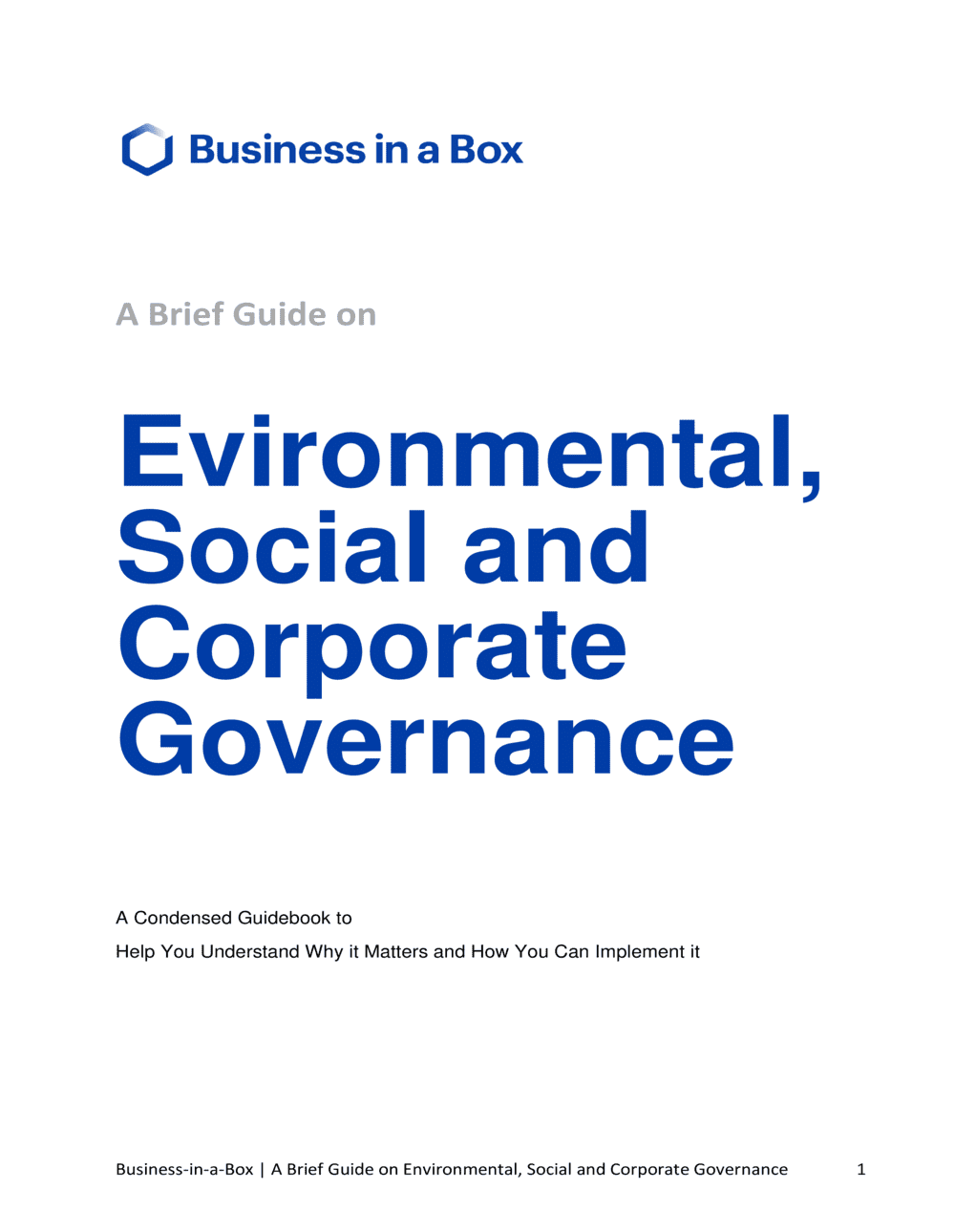Environmental Social and Corporate Governance Template

Document content
This environmental social and corporate governance template has 11 pages and is a MS Word file type listed under our business plan kit documents.
Sample of our environmental social and corporate governance template:
A Brief Guide on Evironmental, Social and Corporate Governance A Condensed Guidebook to Help You Understand Why it Matters and How You Can Implement it Table of Contents Environmental, Social and Corporate Governance - What is it, Why Does it Matter, and How Can You Implement it? 3 What is ESG? 3 The Importance and Advantages of ESG 5 Advantage No. 1 - Lower Business Costs 5 Advantage No. 2 - Improved Productivity 5 Advantage No. 3 - Avoid Regulatory Concerns 6 Advantage No. 4 - Business Growth 6 Advantage No. 5 - Sustainable Investing 7 Four Tips for Getting Started with an ESG Policy 8 Tip No. 1 - Treat ESG as a System of Metrics 8 Tip No. 2 - Focus on Organizational Best Fit 8 Tip No. 3 - ESG is about More Than Environmental Impact 9 Tip No. 4 - Transparency is Critical 10 Create an Ethical Business 10 Environmental, Social and Corporate Governance - What is it, Why Does it Matter, and How Can You Implement it? The topic of ethics is a crucial concern in modern business culture. Business ethics refer to the standards a company puts in place for itself to do what is morally right. While laws partially define the ethics a company may follow, they're not all-encompassing. Businesses are also capable of determining their own ethical structures, which can impact who they partner with, who they employ, and who buys from them. To demonstrate this, a report from global market research group Mintel suggests that 56% of customers will stop buying from a brand they deem unethical. Additionally, it reports that 63% of consumers believe that ethical issues have become more critical in today's business world. So, the motivation for creating a more ethical company is clear. In your efforts to do so, you've likely come across the concept of environmental, social, and corporate governance (ESG) as a means to demonstrate your company's ethics to consumers and potential partners. Here, we will examine what ESG means, why it is essential, and how you can start implementing ESG standards in your business. What is ESG? The purpose of ESG standards is to create an approach to business that focuses as much on stakeholders as it does on making a profit. A company's stakeholders range from its customers and partners to suppliers, manufacturers, and board members. Companies that agree to work towards ESG standards commit to ethically conducting business relating to the three key areas of ESG: Environmental Social Governance Environmental covers the impact that the company's operations have on the planet. It refers to the approach a business takes to tackling climate change, reducing its carbon footprint, and ensuring that its work does not damage ecosystems or create pollution that may cause harm to others. The social element of ESG relates to how the organization affects people both inside and outside the business. Issues to consider here include how the company handles and protects data and its customer service approach. The social aspect also covers the company's policies regarding diversity, gender, and mental health. Finally, governance confronts how the company is run. Here, a business sets standards for recruiting members to its board and the guidelines for executive-level compensation packages. Governance may also cover any political involvement the business has, such as lobbying, and the company's approach to hiring and onboarding new employees. Combined, the standards a company sets for these three areas form its ESG policy. This policy, in turn, outlines the organization's ethical commitments so that the world can see them. The Importance and Advantages of ESG Committing to an ESG policy is beneficial in several ways, particularly for small businesses attempting to carve out a niche for themselves when faced with competition from larger corporations. There are five key advantages to implementing an ESG policy. Advantage No. 1 - Lower Business Costs A firm ESG policy helps a business to save money as a byproduct of its environmental approach. For example, installing a solar panel array may require a significant upfront investment. However, this investment is quickly repaid, after which it results in savings, compared to more traditional energy sources. An environmental policy can also lead to lower energy and water consumption, again reducing costs across the business. Advantage No. 2 - Improved Productivity Employees who believe they're working for an ethically-conscious business are more likely to experience a productivity upswing. The LRN Ethics Study, published by consulting firm LRN, highlights this. The study found that 94% of workers believe it is either "important" or "critical" that their employer has an ethical framework. Interestingly, 82% stated they would accept a lower wage for a role with an ethical company than they would for the equivalent position at a business they believe isn't ethical. What's more, 80% cite ethical conflicts with management or fellow employees as to why they've left a job in the past. The message is simple - ethics matter to your employees. A strong ESG policy shows your people that you take ethical considerations seriously. The result is more engaged and productive employees. Advantage No. 3 - Avoid Regulatory Concerns Governments and other legal entities often place legal restrictions on businesses. For example, restrictions usually apply to daytime television advertising, with products intended for adults often not advertised during periods when children may be watching.
3,000+ Templates & Tools to Help You Start, Run & Grow Your Business

Document content
This environmental social and corporate governance template has 11 pages and is a MS Word file type listed under our business plan kit documents.
Sample of our environmental social and corporate governance template:
A Brief Guide on Evironmental, Social and Corporate Governance A Condensed Guidebook to Help You Understand Why it Matters and How You Can Implement it Table of Contents Environmental, Social and Corporate Governance - What is it, Why Does it Matter, and How Can You Implement it? 3 What is ESG? 3 The Importance and Advantages of ESG 5 Advantage No. 1 - Lower Business Costs 5 Advantage No. 2 - Improved Productivity 5 Advantage No. 3 - Avoid Regulatory Concerns 6 Advantage No. 4 - Business Growth 6 Advantage No. 5 - Sustainable Investing 7 Four Tips for Getting Started with an ESG Policy 8 Tip No. 1 - Treat ESG as a System of Metrics 8 Tip No. 2 - Focus on Organizational Best Fit 8 Tip No. 3 - ESG is about More Than Environmental Impact 9 Tip No. 4 - Transparency is Critical 10 Create an Ethical Business 10 Environmental, Social and Corporate Governance - What is it, Why Does it Matter, and How Can You Implement it? The topic of ethics is a crucial concern in modern business culture. Business ethics refer to the standards a company puts in place for itself to do what is morally right. While laws partially define the ethics a company may follow, they're not all-encompassing. Businesses are also capable of determining their own ethical structures, which can impact who they partner with, who they employ, and who buys from them. To demonstrate this, a report from global market research group Mintel suggests that 56% of customers will stop buying from a brand they deem unethical. Additionally, it reports that 63% of consumers believe that ethical issues have become more critical in today's business world. So, the motivation for creating a more ethical company is clear. In your efforts to do so, you've likely come across the concept of environmental, social, and corporate governance (ESG) as a means to demonstrate your company's ethics to consumers and potential partners. Here, we will examine what ESG means, why it is essential, and how you can start implementing ESG standards in your business. What is ESG? The purpose of ESG standards is to create an approach to business that focuses as much on stakeholders as it does on making a profit. A company's stakeholders range from its customers and partners to suppliers, manufacturers, and board members. Companies that agree to work towards ESG standards commit to ethically conducting business relating to the three key areas of ESG: Environmental Social Governance Environmental covers the impact that the company's operations have on the planet. It refers to the approach a business takes to tackling climate change, reducing its carbon footprint, and ensuring that its work does not damage ecosystems or create pollution that may cause harm to others. The social element of ESG relates to how the organization affects people both inside and outside the business. Issues to consider here include how the company handles and protects data and its customer service approach. The social aspect also covers the company's policies regarding diversity, gender, and mental health. Finally, governance confronts how the company is run. Here, a business sets standards for recruiting members to its board and the guidelines for executive-level compensation packages. Governance may also cover any political involvement the business has, such as lobbying, and the company's approach to hiring and onboarding new employees. Combined, the standards a company sets for these three areas form its ESG policy. This policy, in turn, outlines the organization's ethical commitments so that the world can see them. The Importance and Advantages of ESG Committing to an ESG policy is beneficial in several ways, particularly for small businesses attempting to carve out a niche for themselves when faced with competition from larger corporations. There are five key advantages to implementing an ESG policy. Advantage No. 1 - Lower Business Costs A firm ESG policy helps a business to save money as a byproduct of its environmental approach. For example, installing a solar panel array may require a significant upfront investment. However, this investment is quickly repaid, after which it results in savings, compared to more traditional energy sources. An environmental policy can also lead to lower energy and water consumption, again reducing costs across the business. Advantage No. 2 - Improved Productivity Employees who believe they're working for an ethically-conscious business are more likely to experience a productivity upswing. The LRN Ethics Study, published by consulting firm LRN, highlights this. The study found that 94% of workers believe it is either "important" or "critical" that their employer has an ethical framework. Interestingly, 82% stated they would accept a lower wage for a role with an ethical company than they would for the equivalent position at a business they believe isn't ethical. What's more, 80% cite ethical conflicts with management or fellow employees as to why they've left a job in the past. The message is simple - ethics matter to your employees. A strong ESG policy shows your people that you take ethical considerations seriously. The result is more engaged and productive employees. Advantage No. 3 - Avoid Regulatory Concerns Governments and other legal entities often place legal restrictions on businesses. For example, restrictions usually apply to daytime television advertising, with products intended for adults often not advertised during periods when children may be watching.
Easily Create Any Business Document You Need in Minutes.

Access over 3,000+ business and legal templates for any business task, project or initiative.

Customize your ready-made business document template and save it in the cloud.

Share your files and folders with your team. Create a space of seamless collaboration.
Templates and Tools to Manage Every Aspect of Your Business.
Business in a Box Covers Every Business Department
Includes 16 Types of Business Documents You Need
and Achieve Your Business Goals Faster.
